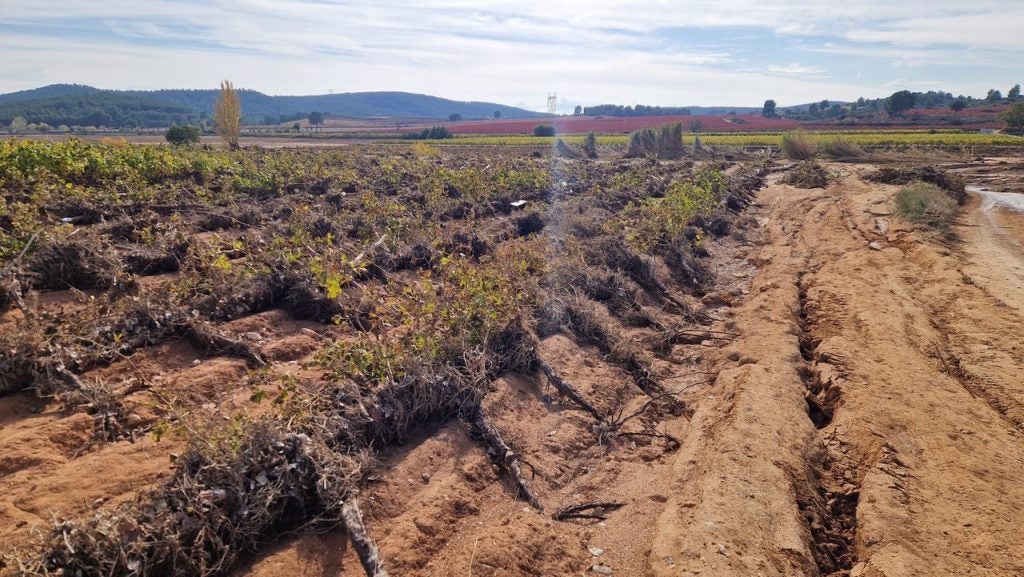Spain’s winemakers are still evaluating the damage caused by the floods that deluged parts of the country last month.
The weather event – known as a ‘Dana’ after its acronym in Spanish (Depresión Aislada en Niveles Altos) – rocked the east and south-east of the country, sparking torrential rains, hail and hurricane-force winds and leading to overflowing ravines and rivers. More than 200 people died.
Agroseguro, the Spanish association of agricultural insurance providers, is still evaluating the damage. They calculate about 25,500 hectares of different cultivated areas were affected.
The province of Valencia took the worst of the weather. According to local trade body Vinos de Valencia, entire fields “disappeared under the water”, with soil eroded to the extent some producers are weighing up whether to replant next season.
“In the interior regions, the force of the water uprooted thousands of vines and other crops that had just experienced one of the driest hydrological years in history, which had caused the death of plantations due to water shortage,” the Asociación Valenciana de Agricultores (AVA-ASAJA), which represents the wider agri sector in Valencia, said.
The AVA-ASAJA does not have a specific estimate for the wine industry but calculates the damage to infrastructure and machinery will amount to about €1.1bn ($1.15bn) for Valencia’s agriculture sector. About 33.728 hectares were affected, according to their reports.
Sources from the association added: “As the grapes have already been harvested, the damage is mostly on agricultural infrastructure and on plantations. Many plots were devastated by the torrential waters and will have to be replanted.”
The Colegio de Ingenieros Agrónomos of Levante (COIAL) agrees the damage could have been worse. “The 2024 harvest is practically in the cellar. Almost all the warehouses are operational: the problems of flooding and lack of electricity have been overcome, the cleaning of machinery is completed but there are still limitations in logistics due to the inaccessibility of roads”, Joaquim Aguilella, dean of COIAL, said.
Vineyards close to the Magro River were devastated, with flood water damaging vines and eroding 50 to 60 centimetres of soil, Aguilella explained.
Repairing the soil will be the biggest challenge, he added, with concerns about the quality of wine.
On a positive note, the affected area amounts to a minor portion of terrain planted with the Utiel-Requena DO.
The representative body for the Utiel-Requena DO in Valencia is continuing with cleaning and reconstruction tasks: “Our district has suffered substantial damage of various kinds: to infrastructure and facilities, vineyards, trellises, agricultural roads and margins, and agricultural machinery. Fortunately, the grape harvest had finished throughout the district, so the campaign is safe,” it said.
Winemakers are now focused on reconstruction. “It is essential to return to something as close to “normal” as possible, the source from Vinos de Valencia said.
However, the source added that “problems have been reported with the departure of goods from the port of Valencia”, an issue ahead of the key Christmas selling season”.
The Spanish government issued several aid packages for companies and individuals affected by the storm, worth more than €13bn.
They include a €200m package for agricultural holdings that cannot carry out the next growing campaign and a programme to repair agricultural infrastructure.
AVA-ASAJA has demanded the government extends the aid and focuses on the needs of winegrowers. “Specifically, they urge the strengthening of direct aid, fiscal measures and plans to acquire machinery, rebuild infrastructure and recover affected plots,” it said.
At COVIAL, Aguilella said the support is welcome but expresses a “hope it doesn't fall short and that it reaches everyone who needs it”.
He added: “The response capacity of the sector is strong and the levels of technology are high. Appropriate controls must be established and damaged vineyards must be carefully managed. If the vineyards is recovered, the wineries are competitive and normality will return. An important factor will be the moment when the vine comes out of its dormancy and begins its cycle in spring.”
This week, residents in southern Spain were evacuated as the next Dana weather system approached. Malaga was placed on the highest alert as strong rain neared and, indeed, lashed the area. Tarragona in Catalonia was also given the same alert level.
Though not as fierce as the weather that buffeted the country last month, the latest episode is a further sign Spain and its agricultural sectors – which have faced months and months of drought conditions – will have to try to prepare for the advent of more extreme weather events in the years ahead.









